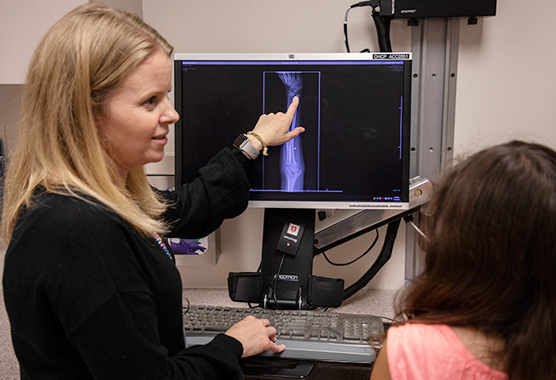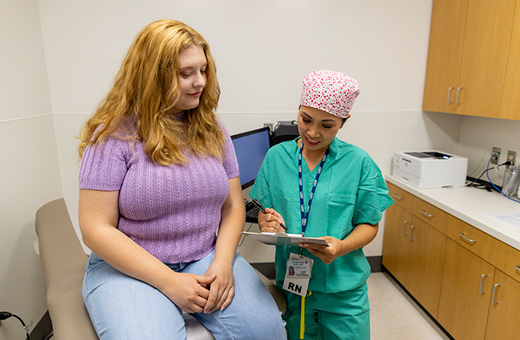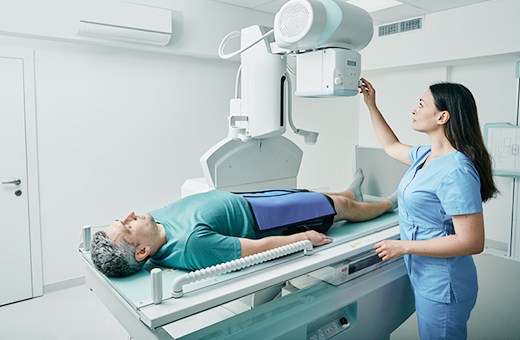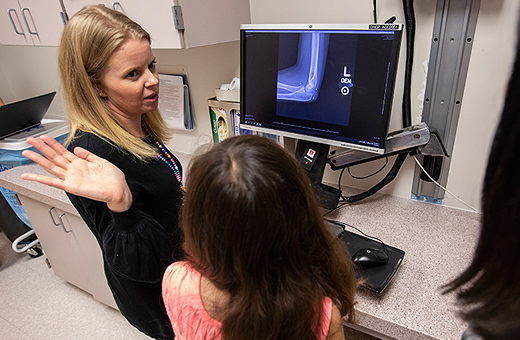Musculoskeletal Radiology
UC Davis Health musculoskeletal radiologists use advanced medical imaging to examine your body. They diagnose and treat muscle, bone and soft tissue conditions.
Medically reviewed by Elizabeth Morris, M.D. on Aug. 30, 2023.

Advanced Musculoskeletal Radiology Services
Our musculoskeletal radiologists use the latest imaging technology to diagnose and treat conditions that affect your musculoskeletal system. This system includes your:
- Bones, joints and spine
- Muscles
- Tendons, ligaments and other soft tissues
Musculoskeletal radiology is a subspecialty of the UC Davis Department of Radiology. Our team specializes in capturing and interpreting images of your muscles, bones and tissues. We also use these images to guide certain procedures.
Musculoskeletal Radiology Services
Our musculoskeletal radiologists specialize in diagnosing common to complex musculoskeletal injuries and other conditions. We use advanced medical imaging techniques to quickly pinpoint the cause of your pain and develop an effective treatment plan.
X-ray
X-rays (also called radiographs) use safe amounts of radioactive beams to create film images of your bones and soft tissues. You may need an X-ray to check for bone fractures, joint disorders or spine conditions.
Fluoroscopy
Fluoroscopy produces moving X-ray images of bones and tissues. Some fluoroscopy procedures require the use of an injectable contrast dye. The dye makes the area of your body clearer in imaging. Your provider may use fluoroscopy to guide joint reconstruction procedures or treat broken bones.
Arthrogram
An arthrogram helps your provider diagnose the cause of hip pain, shoulder pain and other joint problems. Your provider injects a contrast dye directly into your joint. The absorbed dye makes the joint easier to see in medical images, such as X-rays or an MRI arthrogram.
Musculoskeletal Ultrasound
Ultrasounds use sound waves to create images of your muscles, soft tissues, nerves and joints. A musculoskeletal ultrasound helps diagnose muscle and soft tissue disorders, including sprains, strains and tears. The images also show joint swelling and arthritis.
Osteoradiology
Osteoradiology refers to X-rays or imaging that specifically looks for bone conditions and disorders. You may also get an osteoradiology test to check for bone cancer.
Image-Guided Joint Injections and Aspirations
Joint steroid injections help ease arthritis pain. Your provider views medical images from fluoroscopy, ultrasounds or CT scans while injecting medication into an inflamed joint. The provider may also use images to help remove fluid from a swollen joint (joint aspiration).
Request an Appointment
As Sacramento's No. 1 hospital, you'll benefit from unique advantages in primary care and specialty care. This includes prevention, diagnosis and treatment options from experts in 150 specialties.
Referring Physicians
To refer a patient, submit an electronic referral form or call.
800-4-UCDAVIS
Patients
Call to make an appointment.
Consumer Resource Center
800-2-UCDAVIS
Your preparation depends on the type of musculoskeletal radiology procedure. You should follow your provider’s instructions to ensure the best results.
-

Before Musculoskeletal Radiology
Your pre-treatment steps will vary depending on the imaging procedure. If you’re receiving a contrast dye for fluoroscopy, you may not be able to eat, drink or take medications beforehand.
-

During Musculoskeletal Radiology
For a standard X-ray, you may be seated, standing or lying down. Other musculoskeletal radiology procedures often require you to lie down on your back.
-

After Musculoskeletal Radiology
Your radiologist will review the images either that day or within the week. Depending on the results, you may need a cast for a broken bone, injections for inflammation or other treatments.
Home Care
You may need to recover at home after a musculoskeletal radiology imaging procedure. Your recovery depends on what took place. It is important to follow your care team’s instructions.
Take It Easy
Contrast dye injections for fluoroscopy, as well as for joint injections and aspirations, can cause soreness. Don’t overdo it.
Let Your Body Heal
Injured bones, muscles and tissues need time to mend. Follow your provider’s instructions about the types of activities that are safe to do.
Ease Pain and Swelling
Take over-the-counter anti-inflammatory drugs and use warm or cold compresses, as directed by your provider.
When to Contact Your Provider
Call your provider if you received an injection and you notice signs of infection or an allergic reaction. Symptoms include fever, hives or redness and swelling at the treatment site.

Ranked among the nation’s best hospitals
A U.S. News & World Report best hospital in cardiology, heart & vascular surgery, diabetes & endocrinology, ENT, geriatrics, neurology & neurosurgery, and pulmonology & lung surgery.

Ranked among the nation’s best children’s hospitals
U.S. News & World Report ranked UC Davis Children’s Hospital among the best in neonatology, nephrology, orthopedics*, pediatric & adolescent behavioral health, and pulmonology & lung surgery. (*Together with Shriners Children’s Northern California)

Ranked Sacramento’s #1 hospital
Ranked Sacramento’s #1 hospital by U.S. News, and high-performing in aortic valve surgery, back surgery (spinal fusion), COPD, colon cancer surgery, diabetes, gynecological cancer surgery, heart arrhythmia, heart failure, kidney failure, leukemia, lymphoma & myeloma, lung cancer surgery, pacemaker implantation, pneumonia, prostate cancer surgery, stroke, TAVR, cancer, orthopedics, gastroenterology & GI surgery, and urology.

The nation’s highest nursing honor
UC Davis Medical Center has received Magnet® recognition, the nation’s highest honor for nursing excellence.

World-class cancer care
One of ~59 U.S. cancer centers designated “comprehensive” by the National Cancer Institute.

A leader in health care equality
For the 13th consecutive year, UC Davis Medical Center has been recognized as an LGBTQ+ Healthcare Equality Leader by the educational arm of America’s largest civil rights organization.
